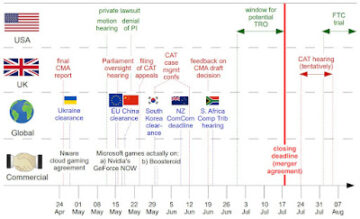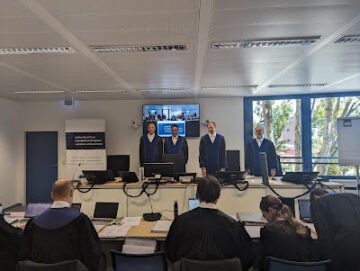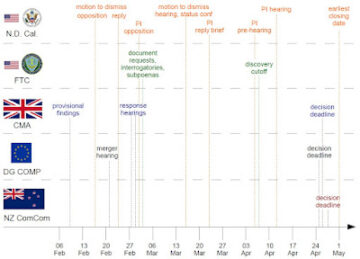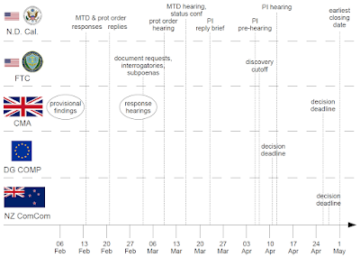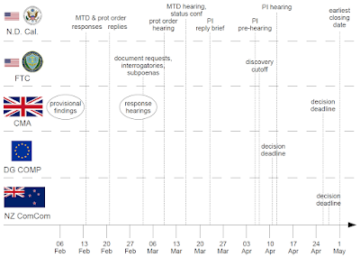
The ink is barely dry on Justice Mellor’s อินเตอร์ดิจิตอล กับ เลอโนโว การพิจารณาคดี, and there is more news from the United Kingdom concerning standard-essential patents (SEPs). The UK Intellectual Property Office (IPO) is seriously contemplating some policy-making (potentially legislative) initiative related to SEPs. But it wants to see หลักฐานที่ยาก that intervention is needed to protect small and medium-sized enterprises (SMEs). To put it bluntly, the IPO is not going to be fooled by lobbyists claiming to represent SMEs while actually working on behalf of large implementers who want to bring down their patent licensing costs.
A few months ago, I was–frankly–shocked that a senior IPO official had accepted an invitation to speak at an ACT | The App(le) Association event, but also relieved to find out from the Office that they were absolutely aware of the fact that Apple funds ACT. I wish the European Commission could wake up and acknowledge this problem, too. The EC allowed ACT and its Google-controlled equivalent called Developers Alliance to participate in a Digital Markets Act workshop earlier this month, claiming to represent small app developers while actually lobbying for the abusive behemoths, a highly problematic practice called astroturfing.
On Tuesday, the UKIPO started a new consultation–though it had already called for views on SEP policy last year–with a questionnaire that will be available until April 24. The UKIPO’s website reflects a profound understanding of the topic. What I particularly like is the following statement by the IPO’s Acting Director of Business and International Policy, Sarah Whitehead, in an explanatory video:
“However, although we have some anecdotal evidence from bodies representing smaller businesses, we did not hear sufficient evidence directly from UK SMEs, small-cap and mid-cap businesses, including their experiences of interacting or using technical standards when innovating.” (emphasis mine)
That is so spot-on.
The system of industry standards–and the licensing ecosystem built around it–is too important to intervene just on the basis of what lobbyists and (especially) astroturfers say.
Apple has not been an SME for about 45 years, much less a UK SME.
There are two “phenomena” in SEP policy debates in the Western hemisphere. Huawei, despite being a large-scale innovator and very reasonable licensor (that also knows the licensee’s perspective), is often used as a bogeyman. And on the other end of the spectrum, there are those claims of SMEs–which policy-makers instinctively seek to shield from abuse–being on the receiving end of SEP abuse. I urge skepticism, and I commend the UKIPO for setting a reasonably high evidentiary standard. There cannot be responsible policy-making without it, but again, as the European Commission’s recent DMA workshop showed, deceptive lobbying is rampant and some policy makers just don’t have the guts to reject dishonest input.
I trust that the IPO will carefully analyze whatever stories it will be told, and will insist on hard evidence. For instance, the Save Our Standards campaign sponsored an interview by an IoT blogger with a U.S. SME, and for me it was easy to figure out that the SME in question never actually had to license SEPs (and not even the customer for which it developed the app they primarily discussed in that interview).
It’s great that the UKIPO finds anecdotal evidence from those representing (or, more accurately, อ้างว่าเป็นตัวแทน) SMEs unreliable. In the next step it’s going to be key to scrutinize whatever input will be given by actual SMEs. If those SMEs are just service providers, their input is meaningless. If they make actual products, what issues are they จริงๆ facing? And do they really need government intervention or would there be reasonably acceptable solutions under the existing framework?
On LinkedIn I raised the following question:
“If SMEs have such a huge problem with SEPs, where are all the SEP enforcement actions against SMEs? Maybe that’s (one of) the first question(s) policy makers should ask when they launch consultations on this topic.”
I’m a litigation watcher. If SMEs got sued over SEPs all the time, I’m sure I’d have noticed. The relatively smallest company I’ve recently seen on the receiving end of SEP enforcement is the German WiFi router market leader (70% share!), and the Munich I Regional Court has identified it as an unwilling licensee.
In 2019 I organized a SEP licensing conference in Brussels. The relatively smallest companies who participated and talked about SEP licensing issues were Nordic Semiconductor, AirTies, and Kamstrup. Now, let’s put that into perspective:
-
Nordic Semi “has more than 1300 employees across the globe” และ market cap north of $3 billion.
-
AirTies was bought out by a private equity fund, Providence Equity Partners, in 2022.
I would argue that each of those three companies has the resources and the sophistication to respond to SEP royalty demands. As does AVM, that German WiFi router maker I mentioned.
Why is SEP litigation against SMEs so hard to come by? Because enforcement against them is not profitable. But only widespread litigation would be hard evidence of an issue serious enough to warrant legislative intervention.
I hope the UKIPO will remain skeptical of the input that it’s now going to receive, knowing that some of it will be orchestrated by Apple-funded lobbying entities. And I would encourage the European Commission to do the same.
ติดตาม @FOSSpatents บน Twitter
ติดตามสิทธิบัตร FOSS บน LinkedIn
LinkedIn เป็นแพลตฟอร์มที่แนะนำหากคุณต้องการเน้นไปที่หัวข้อสิทธิบัตร ในขณะที่ @FOSSpatent จะเพิ่มขึ้นเรื่อยๆ ทวีต เกี่ยวกับการต่อต้านการผูกขาด
แบ่งปันกับผู้เชี่ยวชาญคนอื่นๆ ผ่านทาง LinkedIn:
- เนื้อหาที่ขับเคลื่อนด้วย SEO และการเผยแพร่ประชาสัมพันธ์ รับการขยายวันนี้
- เพลโตบล็อคเชน Web3 Metaverse ข่าวกรอง ขยายความรู้. เข้าถึงได้ที่นี่.
- ที่มา: http://www.fosspatents.com/2023/03/uk-patent-office-declines-to-base.html
- :เป็น
- $3
- $ ขึ้น
- 2019
- 2022
- a
- เกี่ยวกับเรา
- อย่างแน่นอน
- การล่วงละเมิด
- ยอมรับได้
- ได้รับการยอมรับ
- แม่นยำ
- รับทราบ
- ข้าม
- กระทำ
- การปฏิบัติ
- จริง
- กับ
- ทั้งหมด
- พันธมิตร
- แล้ว
- แม้ว่า
- วิเคราะห์
- และ
- ต่อต้านการผูกขาด
- app
- Apple
- เป็น
- เถียง
- รอบ
- AS
- สมาคม
- At
- ใช้ได้
- ฐาน
- รากฐาน
- BE
- เพราะ
- เริ่ม
- เบฮีมอธ
- กำลัง
- พันล้าน
- นำมาซึ่ง
- บรัสเซลส์
- สร้าง
- ธุรกิจ
- ธุรกิจ
- ปุ่ม
- by
- ที่เรียกว่า
- รณรงค์
- ไม่ได้
- ฝาครอบ
- รอบคอบ
- อ้าง
- การเรียกร้อง
- ชัดเจน
- อย่างไร
- คณะกรรมาธิการ
- บริษัท
- บริษัท
- การประชุม
- การให้คำปรึกษา
- ค่าใช้จ่าย
- ได้
- ประเทศ
- ศาล
- CrunchBase
- ลูกค้า
- การอภิปราย
- ลดลง
- ความต้องการ
- แม้จะมี
- พัฒนา
- นักพัฒนา
- DID
- ดิจิตอล
- โดยตรง
- ผู้อำนวยการ
- กล่าวถึง
- ไม่สุจริต
- ดีมา
- ลง
- แห้ง
- แต่ละ
- ก่อน
- EC
- ระบบนิเวศ
- ความสำคัญ
- พนักงาน
- ส่งเสริม
- พลังงาน
- การบังคับใช้
- พอ
- ผู้ประกอบการ
- หน่วยงาน
- ส่วนได้เสีย
- เท่ากัน
- โดยเฉพาะอย่างยิ่ง
- อีเธอร์ (ETH)
- ในทวีปยุโรป
- คณะกรรมาธิการยุโรป
- แม้
- เหตุการณ์
- หลักฐาน
- ที่มีอยู่
- ประสบการณ์
- อธิบาย
- หันหน้าไปทาง
- สองสาม
- รูป
- หา
- พบ
- ชื่อจริง
- โฟกัส
- ดังต่อไปนี้
- สำหรับ
- กรอบ
- ราคาเริ่มต้นที่
- กองทุน
- เงิน
- ภาษาเยอรมัน
- กำหนด
- โลก
- ไป
- รัฐบาล
- ยิ่งใหญ่
- ยาก
- มี
- ได้ยิน
- จุดสูง
- อย่างสูง
- ความหวัง
- อย่างไรก็ตาม
- HTML
- ที่ http
- HTTPS
- หัวเว่ย
- ใหญ่
- i
- ระบุ
- สำคัญ
- in
- รวมทั้ง
- ขึ้น
- อุตสาหกรรม
- Initiative
- นวัตกรรม
- ผู้ริเริ่ม
- อินพุต
- ตัวอย่าง
- ทางปัญญา
- ทรัพย์สินทางปัญญา
- การมีปฏิสัมพันธ์
- International
- แทรกแซง
- การแทรกแซง
- สัมภาษณ์
- คำเชิญ
- IOT
- การเสนอขายหุ้น
- ปัญหา
- ปัญหา
- IT
- ITS
- คีย์
- อาณาจักร
- รู้ดี
- ใหญ่
- ขนาดใหญ่
- ชื่อสกุล
- เปิดตัว
- ผู้นำ
- นิติบัญญัติ
- License
- ลิขสิทธิ์
- กดไลก์
- คดี
- วิ่งเต้น
- lobbyists
- ทำ
- เครื่องชง
- ผู้ผลิต
- ตลาด
- ผู้นำตลาด
- ตลาด
- กล่าวถึง
- เดือน
- เดือน
- ข้อมูลเพิ่มเติม
- จำเป็นต้อง
- จำเป็น
- ใหม่
- ข่าว
- ถัดไป
- ทางทิศเหนือ
- of
- Office
- เป็นทางการ
- on
- ONE
- บงการ
- Organized
- อื่นๆ
- เป็นเจ้าของ
- มีส่วนร่วม
- เข้าร่วม
- โดยเฉพาะ
- พาร์ทเนอร์
- สิทธิบัตร
- สิทธิบัตร
- มุมมอง
- PHP
- เวที
- เพลโต
- เพลโตดาต้าอินเทลลิเจนซ์
- เพลโตดาต้า
- ผู้เล่น
- นโยบาย
- ผู้กำหนดนโยบาย
- การกำหนดนโยบาย
- ที่อาจเกิดขึ้น
- การปฏิบัติ
- ชอบ
- ส่วนใหญ่
- ส่วนตัว
- ตราสารทุนภาคเอกชน
- ปัญหา
- ผลิตภัณฑ์
- มืออาชีพ
- มีกำไร
- คุณสมบัติ
- ป้องกัน
- ผู้ให้บริการ
- ใส่
- คำถาม
- เหมาะสม
- รับ
- การได้รับ
- เมื่อเร็ว ๆ นี้
- เมื่อเร็ว ๆ นี้
- แนะนำ
- สะท้อนให้เห็นถึง
- ของแคว้น
- ที่เกี่ยวข้อง
- สัมพัทธ์
- ยังคง
- แสดง
- เป็นตัวแทนของ
- แหล่งข้อมูล
- ตอบสนอง
- รับผิดชอบ
- เราเตอร์
- พระบรมวงศานุวงศ์
- s
- เดียวกัน
- ลด
- แสวงหา
- กึ่ง
- สารกึ่งตัวนำ
- ระดับอาวุโส
- ร้ายแรง
- บริการ
- ผู้ให้บริการ
- การตั้งค่า
- โล่
- น่า
- ไม่เชื่อ
- ความสงสัย
- เล็ก
- มีขนาดเล็กกว่า
- น้อยที่สุด
- EMS
- SMEs
- So
- โซลูชัน
- บาง
- พูด
- สเปกตรัม
- ผู้ให้การสนับสนุน
- มาตรฐาน
- มาตรฐาน
- คำแถลง
- ขั้นตอน
- จำนวนชั้น
- อย่างเช่น
- ฟ้อง
- เพียงพอ
- ระบบ
- วิชาการ
- ที่
- พื้นที่
- สหราชอาณาจักร
- สหราชอาณาจักร
- โลก
- ของพวกเขา
- พวกเขา
- สาม
- เวลา
- ไปยัง
- เกินไป
- หัวข้อ
- หัวข้อ
- วางใจ
- อังคาร
- เรา
- Uk
- ภายใต้
- ความเข้าใจ
- พร้อมใจกัน
- สหราชอาณาจักร
- Ve
- ผ่านทาง
- วีดีโอ
- ยอดวิว
- ปลุก
- ตื่นนอน
- หมาย
- Website
- ตะวันตก
- อะไร
- ที่
- ในขณะที่
- WHO
- แพร่หลาย
- อินเตอร์เน็ตไร้สาย
- จะ
- กับ
- ไม่มี
- การทำงาน
- การประชุมเชิงปฏิบัติการ
- โลก
- จะ
- ปี
- YouTube
- ลมทะเล


